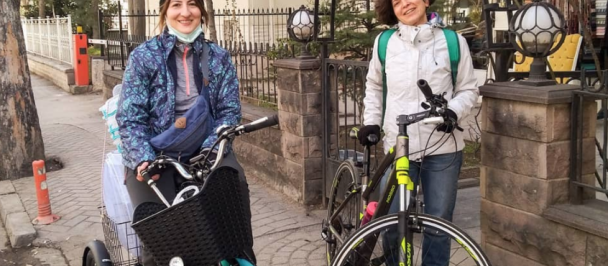The educational programme, which applied systems thinking methodology on climate change and environmental education whilst also using the simulation game "World Climate" as a tool, was implemented for the first time in Turkey with the participation of eighth grade students at Darüşşafaka Secondary School.
The training programme, implemented for the first time in Turkey with the aim of improving the understanding of the climate crisis amongst young students and encouraging them to take action to combat it, was organized in cooperation with the Systems Thinking Association, Darüşşafaka Secondary School, Boğaziçi University and UNDP Turkey Accelerator Laboratory
The educational programme, which applied systems thinking methodology on climate change and environmental education whilst also using the simulation game "World Climate" as a tool, was implemented for the first time in Turkey from September to December 2021 with the participation of eighth grade students as an after-school programme at Darüşşafaka Secondary School.
By creating an environment that encourages climate action, this programme enabled the students to develop a comprehensive understanding of the complex structures and functions of the climate system. Students were also able to develop a more critical and creative mindset to design policies by using simulations. In turn, both allowed students to recognise that the climate crisis does not simply represent an environmental problem. For instance, students were required to examine in detail the socio-political and economic dimensions of the problem and its interrelationships with other global issues. Solutions were then developed by the students on a global, local and individual scale.
During the course of the programme, the changes in the knowledge, attitudes, and motivations amongst the students concerning climate change were measured and monitored using pre- and post-programme testing. It was determined that the rate of prevalence amongst students agreeing with the belief that climate change is already taking place was significantly high; preliminary findings revealed that 84 percent of students believe that global climate change is happening today, and 90 percent believe that climate change represents a crisis presently. Upon completion of the programme, all students were found to report that they believed climate change was happening, with 95 percent agreeing to this unconditionally. In addition, 90 percent of students stated that they attribute climate change as being largely or completely caused by human activities.
When environmental attitudes held by the students were examined, it was revealed that students presented having more environmentally-centred attitudes that embraced the value and importance of the integrity of nature and less so human-centred attitudes that emphasise the benefits of the environment for people. At the end of the programme, it was observed that there was a significant increase in eco-centered attitudes being held by students. When the hope perspective of the students was also examined, students showed a significant increase, compared to their pre-test results, in the belief that social and individual solutions to reduce the effects of climate change can be found.
During the ‘World Climate”, a role-playing game where students simulate United Nations climate change negotiations, students negotiated using the knowledge on climate science they developed during the programme to design and evaluate potential solutions to the climate crisis. Following completing the game, the majority of students emphasised the importance of countries working together to tackle the climate crisis.
When students were invited to produce solutions to tackling various factors that contribute to the climate crisis (such as the use of fossil-fuels, transportation, industrial emissions, and population growth) they were first asked to produce solutions that could be applied on a global-level, and then solutions that could be applied on a more individual-level and school-level. Suggested solutions included: using bicycles and/or public transportation instead of private vehicles; optimizing vehicles used during school trips; more frequently discussing the ecological, social and economic problems caused by population growth; promoting the “World Climate” game and carrying out further studies on climate change; reducing the waste generated during school trips, purchasing new clothes based on genuine need rather than based on trends; donating clothing to those in need; examining the energy sources used in the school and proposing actions to reduce energy demand; and organizing awareness-raising campaigns through social media.
Darüşşafaka R&D Coordinator Meltem Ceylan Alibeyoğlu stated “We observed that the proposed solutions serve many different Sustainable Development Goals, from responsible consumption and production to good health and well-being.”
Boğaziçi University faculty member responsible for scientific measurements, Dr. Gaye Defne Ceyhan MacLellan reported “Thanks to this programme, students are able to evaluate how the structure of the climate system is shaped by human behaviour with the help of numerical models, and also present solutions to the climate crisis using the knowledge they have gained.”
The programme enabled students to develop their information organisation skills, defining the relationships between concepts related to the climate system and generating data-based solutions to the complex problems concerning the climate crisis based on these relationships. As a result, students have developed skills, such as scientific literacy, data-based decision making, collaborative learning and using digital tools – essential skills in the 21st Century.
Ülkem Yararbaş, from the Systems Thinking Association, said “We observed when the systems [thinking] approach is used, students are able to easily identify the relationships between population and migration, economy and consumption, emissions and global warming problems within a short period of 8 weeks and also to produce solutions that take these interactions into account.”
“We identified that using systems thinking in climate and environmental education is successful in developing a holistic picture and understanding of the climate crisis amongst the young students.” UNDP Turkey Accelerator Lab Head of Solutions Mapping Gülşah Eker said, "We want to promote greater understanding because combating the climate crisis will be made possible through individual and collective actions that change our daily habits and rituals."
The programme, initially intended to be short-term, will be extended due to the strong demand from the students; it will be moved to a second phase where the solution proposals will be evaluated more comprehensively, with some of them being put into action. Work continues on a programme that will make methods such as systems thinking and simulation more accessible in education. For more information: https://bit.ly/sistemdusuncesi

 Locations
Locations


